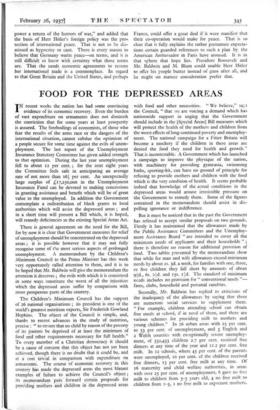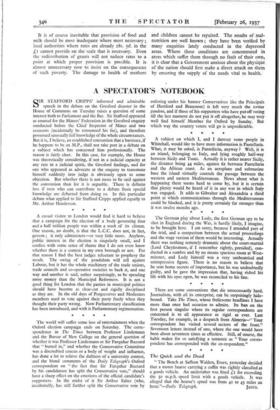FOOD FOR THE DEPRESSED AREAS
TN recent weeks the nation has had some convincing
evidence of its economic recovery. Even the burden of vast expenditure on armaments does not diminish the conviction that for some years at least prosperity is assured. The forebodings of economists, of those who fear the results of the arms race or the dangers of the international situation, cannot subdue the optimism of a people secure for some time against the evils of unem- ployment. The last report of the Unemployment Insurance Statutory Committee has given added strength to that optimism. During the last year unemployment fell to about 12 per cent. ; for the next eight years the Committee feels safe in anticipating an average rate of not more than 161 per cent. An unexpectedly large surplus of £17,25o,000 in the Unemployment Insurance Fund can be devoted to making concessions in granting assistance and benefit which will be of great value to the unemployed. In addition the Government contemplate a redistribution of block grants to local authorities 'which will assist the depressed areas ; and in a short time will present a Bill which, it is hoped, will remedy deficiencies m the existing Special Areas Act.
There is general agreement on the need for the Bill, for by now it is clear that Government measures for relief of unemployment should be concentrated on the depressed areas ; it is possible however that it may not fully recognise some of the most serious aspects of prolonged unemployment. A memorandum by the Children's Minimum Council to the Prime Minister has this week very opportunely called attention to them, and it is to be hoped that Mr. Baldwin will give the memorandum the attention it deserves ; the evils with which it is concerned in some ways constitute the worst of all the injustices which the depressed areas suffer by comparison with more prosperous parts of.the country.
The Children's Minimum Council has the support of 26 national organisations ; its president is one of the world's greatest nutrition experts, Sir Frederick Gowland Hopkins. The object of the Council is simple, and, thanks to recent advances in the study of nutrition, precise " to ensure that no child by reason of the poverty of its parents be deprived of at least the minimum of food- and other reqUirements necessary for full health." To every member of a Christian .democracY it should be a cause of concern that this object has not yet been achieved, though there is no dOubt that it could be, and at a cost trivial in comparison with expenditure on armanienti The course of economic recovery in this country has made the. depressed areas the most blatant example of failure to achieve the Council's object ; its memorandum puts- forward certain proposals for providing 'mothers and Children in the dePressed areas
with. food and other necessities. " We believe," say3 the Council, " that we are voicing a demand which has nationwide support in urging that the Government should include in the [Special Areas] Bill measures which will protect the health of the mothers and children from the worst effects of long-continued poverty and unemploy- ment. The national campaign for a Fitter Britain will become a mockery if the children in these areas arc denied the food they need for health and growth." That is incontestable. A Government which has launched a campaign to improve the physique of the nation, with machinery for providing gymnasia, swimming baths, sporting-kit, can have no ground of principle for refusing to provide mothers and children with the food which is the very condition of health. It seems probable indeed that knowledge of the actual conditions in the depressed areas would arouse irresistible pressure on the Government to remedy them. Some of the figures contained in the memorandum should assist in dis- pelling ignorance or indifference.
But it must be noticed that in the past the Government has refused to accept similar proposals on two grounds. Firstly it has maintained that the allowances made by the Public Assistance Committees and the Unemploy- ment Assistance Board " are intended to cover all the minimum needs of applicants and their households " ; there is therefore no reason for additional provision of food. Two tables presented by the memorandum show that while for man and wife allowances exceed minimum needs by about 2s. 3d. a week, for families with onc, three, or five children they fall short by amounts of about 91d., 6s. 21d. and i5s. 11d. The standard of minimum needs includes no provision for " conventional needs "- fares, clubs, household and personal sundries.
Secondly, Mr. Baldwin has replied to criticisms of the inadequacy of the allowances by saying that there are numerous social services to supplement them. " For example, children attending school can obtain free meals at school, if in need of them, and there are various schemes for providing milk to mothers and young children." In 26 urban areas with 25 per cent. to 53 per cent. of unemployment, and 3 English and 2 Welsh counties with exceptionally severe unemploy- ment, of 532,433 children 2.7 per cent. received free dinners at any time of the year and 12.2 per cent. free milk. In 22 schools, where 45 per cent. of the parents were unemployed, to per cent. of the children received free dinners, 13 per cent. free milk at any time. Of i6 maternity and child welfare authorities, in areas with over 25 per cent. of unemployment, 6 gave no free milk to children. from 3-5 years old, 4 no free milk to children from 1-5, t no free milk to expectant mothers. It is of course inevitable that provision of food and milk should be most inadequate where most necessary-; local authorities where rates are already 28s. 5d. in the f I cannot provide on the scale that is necessary. Even the redistribution of grants will not reduce rates to a point at which proper provision is possible. It is almost unnecessary now to insist on the consequences of such poverty. The damage to health of mothers and children cannot be repaired. The results of mal- nutrition are: well known ; they have been verified by many enquiries lately conducted in the depressed areas. Where these conditions are concentrated in areas which suffer them through no fault of their own, it is clear that a Government anxious about the physiqUe of the nation should first make a direct attack on them by ensuring the supply of the needs vital to health.



















































 Previous page
Previous page